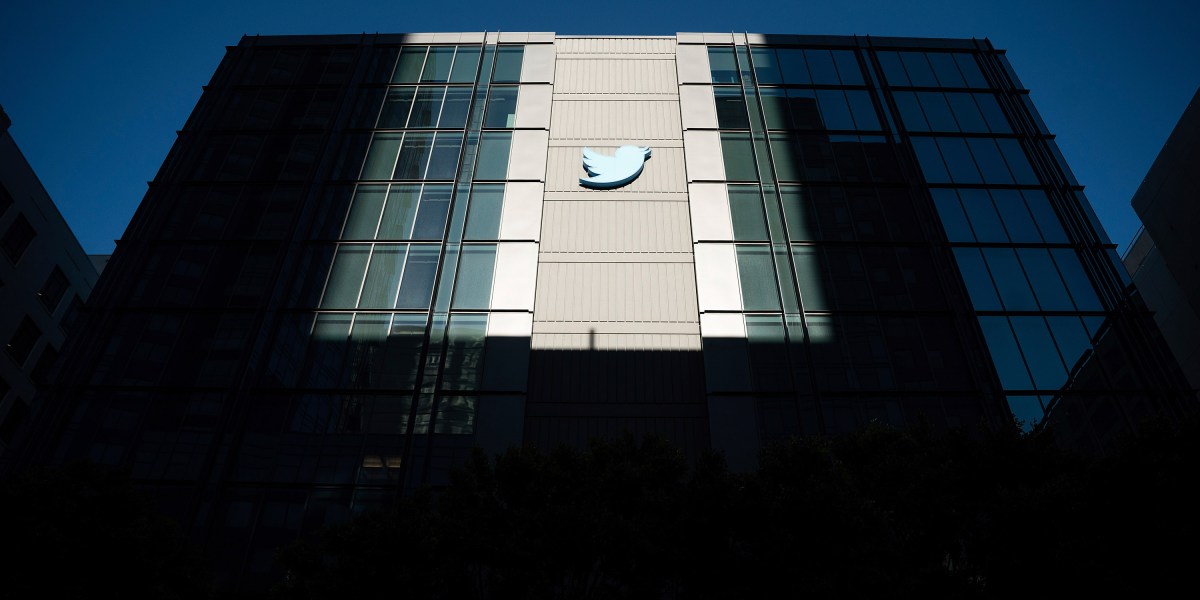Twitter may have lost more than a million users since Elon Musk took over
In the days after Elon Musk’s October 27 purchase of Twitter was confirmed by his tweet saying “the bird is freed,” many Twitter users have threatened to leave, unhappy about the new ownership.
People always threaten to leave Twitter and then often fail to follow through—but new data suggests that a significant number of users really are abandoning the platform this time.
The firm Bot Sentinel, which tracks inauthentic behavior on Twitter by analyzing more than 3.1 million accounts and their activity daily, believes that around 877,000 accounts were deactivated and a further 497,000 were suspended between October 27 and November 1. That’s more than double the usual number.
“We have observed an uptick in people deactivating their accounts and also Twitter suspending accounts,” says Christopher Bouzy, Bot Sentinel’s founder.
Bouzy and Bot Sentinel arrived at their numbers by looking at the proportion of users they analyze who had deactivated their accounts or been suspended after Musk’s Twitter takeover, and then applying that percentage to Twitter’s overall user base, which currently stands at around 237 million “monetizable daily active users”.
From October 27 through November 1, Bot Sentinel found that 11,535 accounts they were monitoring had been deactivated—meaning someone chose to close an account down. A further 6,824 were suspended, which happens when Twitter proactively removes accounts for inactivity, inauthenticity, or violation of site rules. That’s approximately 0.59% of the accounts Bot Sentinel monitors. In the week before Musk bought Twitter, only 5,958 accounts were deactivated or suspended, suggesting a 208% increase in account losses in the days after the purchase went through.
“We believe the uptick in deactivations is a result of people upset with Elon Musk purchasing Twitter and deciding to deactivate their accounts in protest,” says Bouzy, pointing to the anecdotal evidence of people posting about quitting the site.
Manoel Ribeiro, an academic at EPFL Lausanne in Switzerland who studies niche internet communities including the alt-right and how they are affected by moderation policies and algorithms, agrees. “There seems to be indeed an attempt from many to migrate to other platforms, such as Mastodon,” he says.
Twitter did not immediately respond to a request for comment. Elon Musk did not immediately respond to an email.
Bouzy believes the uptick in the number of account suspensions is in part due to hate speech from a proportion of the user base testing what they can and can’t say on the site now that it is under Musk’s control. “We also believe the increase in suspensions is from Twitter taking action on accounts purposely violating Twitter’s rules to see if they can push the limits of ‘free speech,’” he says. It’s unknown what proportion of those suspended by Twitter have been judged to be inauthentic (i.e., bots) as opposed to breaching the platform’s rules on acceptable speech.
Separate analysis by the Network Contagion Research Institute, a research group, shows that use of the N-word on Twitter increased by almost 500% in the 12 hours after Musk announced he had completed the deal. Simultaneously, various examples of derogatory “copypasta” (blocks of text copied and pasted into posts, popular with users of image boards like 4chan), are being posted with impunity.
The uptick in hate speech comes right as the company has frozen access to content moderation tools for much of its trust and safety team. Only 15 people have access to tools that enable them to remove posts, according to Bloomberg; hundreds usually have that ability. Yoel Roth, Twitter’s head of safety and integrity, tweeted that the move was planned as part of the corporate transition, to “reduce opportunities for insider risk.” The platform also has automated moderation tools that work alongside human moderators, Ribeiro points out.
For Savvas Zannettou, assistant professor at Delft University of Technology and a core member of the iDRAMA Lab, a multi-institution research group that analyzes fringe online communities, it’s the first indication of a larger problem for Twitter. “I think this is the first chapter of the mass exodus from the platform,” he says. “I believe that as the new Twitter starts rolling out changes, it’s likely that there will be additional waves of users leaving Twitter.”
Bouzy also reckons the hostile environment on Twitter will promote user attrition in the long run. “I believe if users continue to deactivate their accounts en masse, it will become a significant problem for the platform,” he says. “If left-leaning and marginalized people leave the platform, Twitter will not differ from Parler or Truth Social.”




